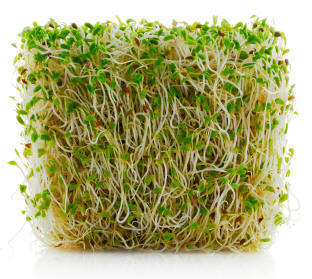1. What are the three edible parts of a grain?
2. What are the two power-packed parts that are usually reduced or removed when processing for refined, white flour products?
3. What should the first ingredient be when choosing a Whole Grain? What should it NOT be?
4. What types of oats should you avoid due to sugars and other additives?
5. You're not actually planning to write out answers to these, are you?
I hope maybe you can recall at least a few of those answers! But if not...
1) bran, germ, endosperm
2) brand, germ
3) "whole" ___ (wheat flour, oat flour, etc) not "Refined" or "enriched"
4) flavored instant oats! (Oat groats are the least processed, followed by steal-cut, then you get into your rolled oats and quick-cookers. These are all healthy!)
5) probably not ;-)
So on to sprouting!

Sprouting seeds and grains for nutrition is a concept I only came across in the last year or so, when I was studying different type of diets. Raw foodists will not cook food, so when it comes to grains, they will often soak them to the point that the little germ begins to grow a tail! It sprouts! (Remember, the germ is the baby seed within the kernel that can grow another plant!) The theory is that is has all this awesome nutritional power locked in that seed - after all, it has to grown another plant! (Though usually, you grown your seed in nutrient-rich soil, so, sometimes foodies grow their sprouts in little trays of soil - but that's more intensive.)
Remember the ol' school days when you took a sunflower seed, laid it on a damp papertowel, then pressed it against a clear cup so you could see it? Eventually, it began to sprout and grow a sunflower! It's the same concept - using water to begin the growth process of the plant, since the seed has growth-inhibitors on it allowing it to remain dormant until it is time to stretch and grow! However, in sprouting, instead of letting the seed fully grow into a new plant, once the tail has grown a bit (anywhere from a few centimeters to a few inches) people will eat them! They may be added to salads, sandwiches, wraps, smoothies...
Now, since at first I had only seen raw foodists promoting sprouting (and sometimes over promoting as some magical cure-all...) I was skeptical. I have bought broccoli sprouts from the store now and then just for variety on my salads. But I finally found a site that convinced me to give it a more serious look. The Whole Grain Counsel has a page on sprouting, and the science and research behind it. Nice! Of course, there are also some studies saying there is no benefit... who do you believe? The jury is still out, sadly. But, hey, maybe give it a try yourself and just see what you think!
You can sprout your own grains, but for now, I just wanted to share about products made from sprouted grains. (I know, I know - I usually say to try to limit processed foods - but unless you want me to get into the details of the sprout-it-yourself process, this is a more convenient option for now!)
The fisrt brand I heard of was Ezekiel Breads, and also Genesis Breads - and they fanned out beyond just breads into tortillas, English muffins, ground flours, and other grain products! (I am not specifically endoring those brands above others - they are just the two I have seen in my store. Look around! Experiment! Try something new!) They are usually stored in the freezer section of stores, and do tend to cost more. I go through them slowly, so I don't mind it now and then as a treat! I also like them for the flavor - they get some good hearty flavors iwth pumpkin seeds, sunflower seeds, and other wonderful nutty additions!


So, the Whole Grains Counsel has a page on sprouted products, and here are some key points form it:
So hopefully research will continue in this area, but the outlook is promising! I have actually been soaking some wild rice for the last few days, and hope to try a new recipe with that tonight! I'll keep ya posted on that!
Allrighty then! That's it for whole grains! There's the bell; time for lunch; class dismissed!
~Katie
No comments:
Post a Comment